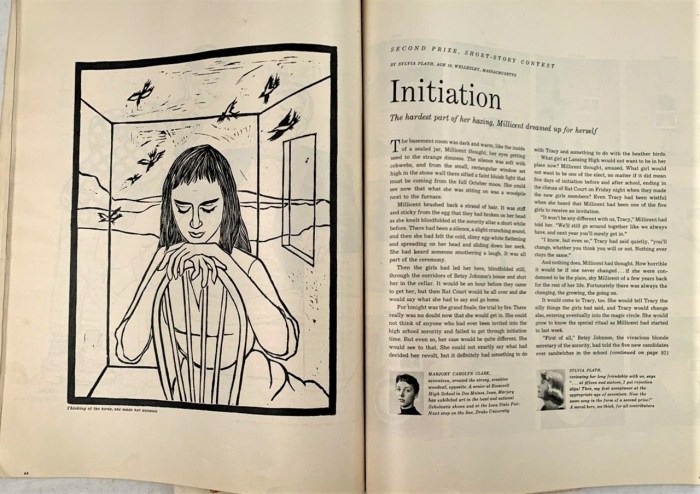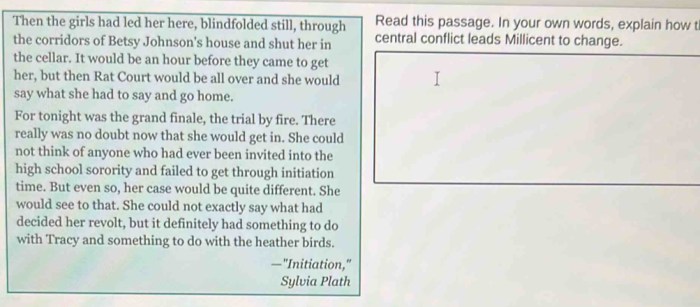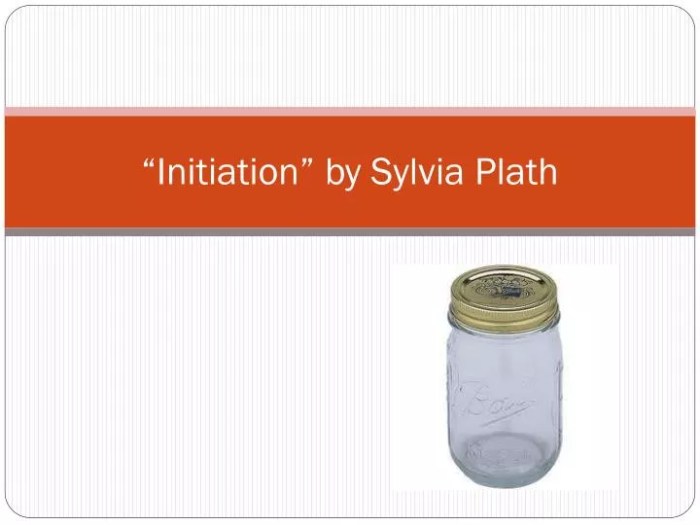Initiation by sylvia plath summary – Initiation by Sylvia Plath, a profound and evocative poem, unveils a journey of self-discovery, trauma, and female empowerment. Plath’s deeply personal experiences as a woman and her struggles with mental health profoundly shaped this masterpiece, offering a glimpse into the complexities of human nature.
Through the lens of symbolism, imagery, and psychological interpretation, this analysis delves into the poem’s intricate layers, exploring its feminist themes, cultural context, and critical reception. Initiation by Sylvia Plath emerges as a testament to the power of poetry in capturing the complexities of human experience.
Introduction to “Initiation” by Sylvia Plath

Sylvia Plath’s “Initiation” is a powerful and evocative poem that explores themes of trauma, loss, and self-discovery. Written in 1960, the poem reflects Plath’s own experiences with mental illness and the social pressures faced by women in the mid-20th century.
Symbolism and Imagery in “Initiation”: Initiation By Sylvia Plath Summary

Plath uses a wealth of symbols and imagery to convey the poem’s themes. The “white gossamer” of the moon represents both purity and fragility, while the “black hook” of the crow symbolizes death and violence. The “initiation” itself is a metaphor for the painful process of growing up and coming to terms with one’s own mortality.
Structure and Form of “Initiation”
The poem is written in free verse, with a loose rhyme scheme and irregular meter. This gives the poem a sense of urgency and immediacy, reflecting the speaker’s raw emotions.
Feminist Perspective in “Initiation”
Plath’s experiences as a woman significantly influenced the poem. The speaker’s sense of vulnerability and powerlessness reflects the societal expectations and limitations placed on women at the time. The poem also explores the complex relationship between mother and daughter, and the ways in which women can both support and oppress each other.
Psychological Interpretation of “Initiation”
The poem is also rich in psychological symbolism. The speaker’s descent into madness can be seen as a metaphor for the trauma and loss she has experienced. The poem also explores the themes of self-harm and suicide, reflecting Plath’s own struggles with mental illness.
Cultural and Historical Context of “Initiation”
The poem was written during a period of great social and political change. The rise of the women’s movement and the Cold War influenced the poem’s themes of female empowerment and the threat of nuclear annihilation.
Comparison with Other Sylvia Plath Poems
“Initiation” shares similarities with other poems by Sylvia Plath, such as “Daddy” and “Lady Lazarus.” These poems all explore themes of trauma, loss, and female identity. However, “Initiation” is unique in its focus on the process of growing up and coming to terms with one’s own mortality.
Critical Reception of “Initiation”, Initiation by sylvia plath summary
“Initiation” has been praised by critics for its powerful imagery, emotional intensity, and psychological depth. It is considered one of Plath’s most important poems and has been widely anthologized and studied.
FAQ Section
What is the central theme of Initiation by Sylvia Plath?
The poem explores themes of trauma, loss, female empowerment, and the search for self-discovery.
How does Plath use symbolism in the poem?
Plath employs vivid imagery and symbols, such as the “white enamel” and “red meat,” to convey the psychological and emotional turmoil of the speaker.
What is the feminist perspective in Initiation?
The poem examines the experiences of women and challenges societal norms, highlighting the struggles and resilience of female identity.

